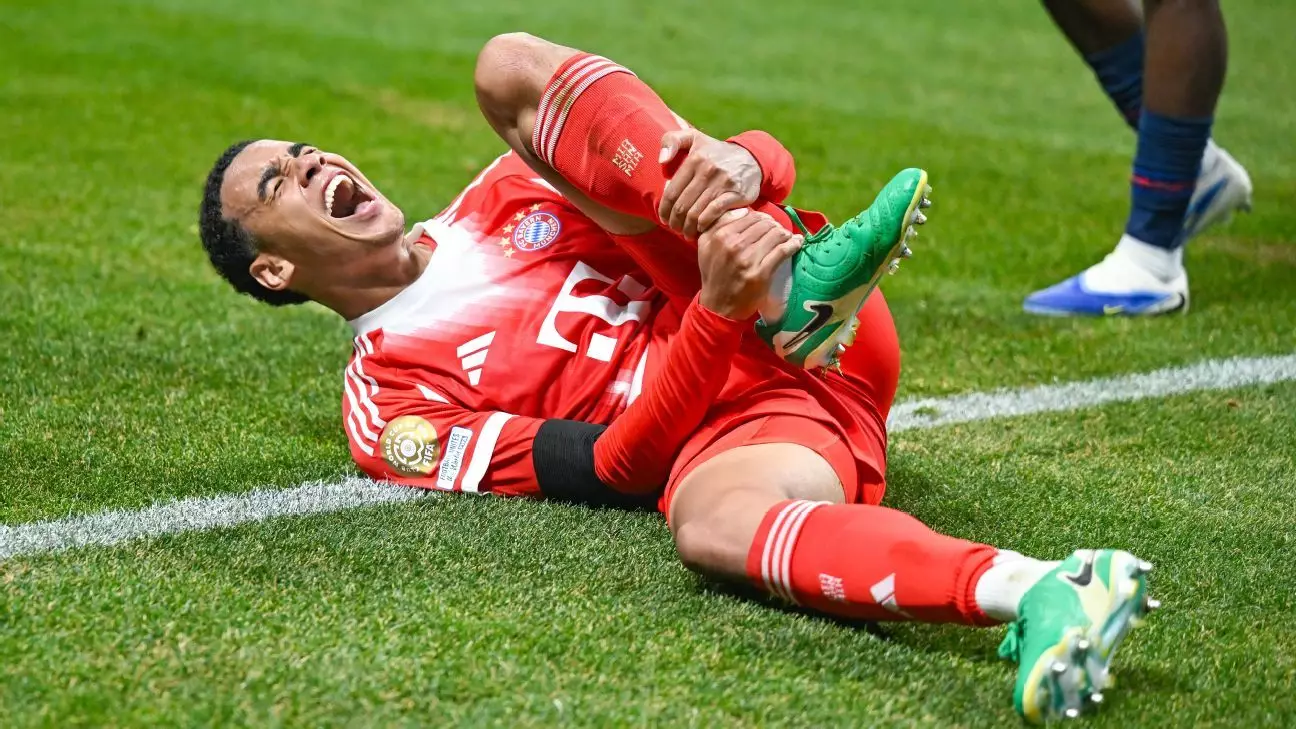In the high-stakes world of professional football, few moments are as jarring as witnessing a promising talent suffer a severe injury. Jamal Musiala’s recent setback during the Club World Cup epitomizes this harsh reality. A fractured fibula and dislocated ankle are not merely physical injuries—they threaten to derail a career that has been nothing but meteoric. Such injuries serve as stark reminders that even the most skilled athletes operate on a razor’s edge of physical and mental resilience. For Musiala, this isn’t just about returning to the field; it’s about overcoming a deeply personal and professional challenge that tests every ounce of his character.
Beyond the immediate physical trauma, the emotional resonance of this injury is immense. Young players like Musiala often embody hope and promise, inspiring fans and teammates alike. When suddenly sidelined, especially by a catastrophic injury, they grapple not only with physical pain but also with despair and uncertainty about their future. The psychological impact can linger long after the wound is healed, affecting confidence and motivation. It’s a stark illustration of the mental toughness required to navigate the volatile landscape of elite sports, and how crucial the support system around athletes truly is.
The Ethical Landscape: Challenges in Competitive Sportsmanship
The controversy surrounding Gianluigi Donnarumma’s challenge raises profound questions about sportsmanship and player accountability. Manuel Neuer’s criticism underscores an almost universal expectation within football: that players exercise fairness and restraint, especially when an opponent’s safety is at risk. Donnarumma’s aggressive approach, as described, appears to verge on carelessness—an act that could be interpreted as reckless rather than competitive. Such moments ignite debates about the fine line between assertiveness and recklessness, and whether the fierce competitiveness of football justifies dangerous plays.
From a broader perspective, this incident reflects a recurring dilemma in modern sports: how to balance aggression with safety. While physicality is ingrained in football’s DNA, players must be acutely aware of the potential repercussions their actions can have—not just for the outcome of a game, but for a fellow athlete’s future. Neuer’s admonition, though somewhat stern, highlights a moral obligation players bear. As role models, they are tasked with upholding the integrity and safety of their sport, especially in high-stakes moments where tempers and tensions escalate.
Reflections on Resilience and the Future of Musiala’s Career
Musiala’s swift return to Munich for surgery underscores a staunch commitment to recovery, a trait every top athlete must possess. His injury, though devastating, can serve as a catalyst for growth—mentally, physically, and strategically. Historically, many players have bounced back from severe injuries, often emerging stronger and more focused. Yet, this is no guarantee; setbacks can breed frustration and doubt, especially for someone as young and crucial to Bayern’s future as Musiala.
The club’s support, articulated by Max Eberl, is vital. An athlete’s recovery journey involves not just medical treatment but also psychological encouragement, tailored training regimens, and an environment that fosters patience. Musiala’s resilience will be tested not just in his physical rehabilitation but in his ability to maintain confidence and passion. His injury acts as a stark reminder that brilliance is often fleeting and fragile—requiring unwavering dedication and a nurturing support system to rebuild and keep forging ahead.
While the road to full recovery remains uncertain, Musiala’s experience exemplifies the unpredictable volatility of sports—the countless hidden battles athletes face behind the scenes. Ultimately, his story is a testament to the indomitable spirit required to navigate the perilous path of professional football, promising that even in adversity, true greatness can still be forged.

